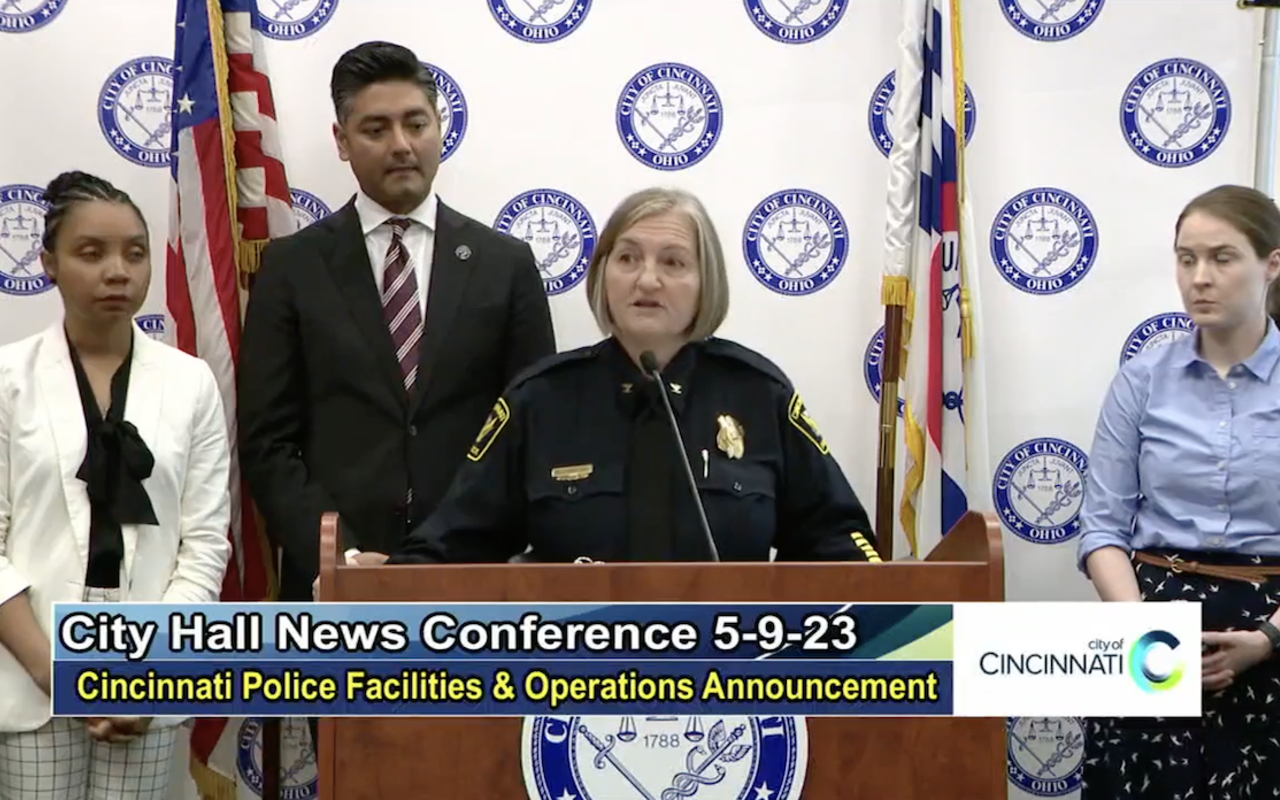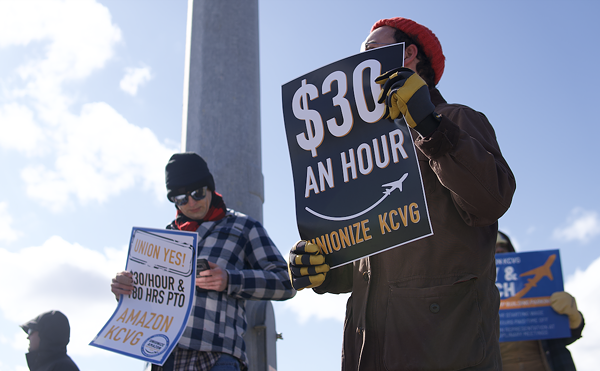This story is featured in CityBeat's May 17 print edition.
The Cincinnati Police Department has made headlines twice in May for radically different reasons: News of yet another internal investigation into an officer who made racist remarks on the job broke on May 1, a problem CPD was hoping to leave behind in 2022. And then the department announced it plans to dissolve its fifth district into the city’s remaining four newly redrawn districts.
While CPD’s Fraternal Order of the Police (FOP) union was quickly front and center with reactions to both announcements, a lesser-known group of CPD officers, known as the Sentinel Police Association, has its own perspective — and sometimes a different take — on the winds of change blowing through the department.
CityBeat sat down with the president of the Sentinels to talk about how these May events, while seemingly very different, tie into the mission of the decades-old police organization.
Founded in a Seminal Year
In 2019, Danita Pettis became the second-ever Black female captain of any CPD district. Pettis now leads District 2, but in January 2022, she also started to lead the Sentinels.
The association was formed in 1968 by a group of African-American officers.
“Because they believed that there was so much disparity in the hiring of African-American officers, and the promotion of African-American officers and the selection for job assignments of African-American officers, they formed this group to kind of act as watchdogs — or sentinels, as the name suggests — to watch over and kind of keep close watch on how the police department was going about doing things,” Pettis tells CityBeat from behind her desk at the District 2 headquarters in Hyde Park. “At that time, in 1968, you can imagine what the political climate was like.”
The year 1968 was marked by the assassination of Martin Luther King Jr. and subsequent riots in Cincinnati’s Avondale neighborhood. Two people were killed and more than 200 were injured in the civil unrest that prompted a response from the National Guard.
Ever since, the Sentinels have weighed in on issues for both civilian and badge-wearing minorities, including the creation of Cincinnati’s landmark 2003 Collaborative Agreement, which arose from federal court-ordered mediation after the 2001 police killing of 19-year-old Timothy Thomas, an unarmed Black man. The agreement sought to shift the Cincinnati Police Department away from aggressive policing tactics toward more community-oriented policing. It created the Citizens Complaint Authority and set out goals to diversify the city's police force.
Pettis tells CityBeat the Sentinels, which has approximately 200 members, offers career coaching to Cincinnati officers who are trying to climb the ranks.
“We help individuals to better themselves. If people feel that, ‘Well, I put in for this job assignment, and I don't seem to be able to quite hit the mark, what are some things I can do to better myself?'” Pettis says.
CPD’s overall force is 27.5% Black — a ratio that remains relatively consistent across the city’s five districts. That’s far below the city’s Black population, which the census puts at 40.3%. And Pettis tells CityBeat the ratio is abysmal for higher-ranking officers, like those in the Investigations Bureau.
“Like, less than 10%, maybe 15%, were minority. And that's in an Investigations Bureau when I know you have a lot of homicides; most of the homicides, a lot of them, are African American,” Pettis says.
Pettis says the Investigations Bureau jobs pay the same as beat patrol officer, but there’s more prestige, and there’s more overtime, leading to more consistent pay.
“They're perceived as, you know, a higher tier of a police officer,” Pettis says. “Some people may have come on and they said, ‘Well, it's always been my desire to be a homicide detective.’ Okay, a homicide detective makes the same per hour, the same hourly wage as a beat officer, but they're subject to a lot more overtime, recall, so your income is higher just because there's overtime built into your position.”
Pettis told CityBeat she brought up the hiring disparities to CPD Chief Teresa Theetge after she was sworn in as the city’s first female police chief in January. Pettis says Theetge was receptive, but didn’t have a solution in the moment.
“And my question to her was, ‘Well, we have this assignment report that shows there's a huge disparity here. So what do we use this report for? What are you going to do with the information?’” Pettis says. “And I can't really say that she gave an answer in terms of, ‘Well, this is what I'm going to do to fix it.’ The conversation didn't get there.”
Pettis says she still hasn’t heard a plan from the chief about how to increase hiring of Black and brown officers in high-ranking investigative positions, but Theetge may well be busy with other items on her agenda — several of which became public earlier this month.
Reduce, redraw — and fewer opportunities
City officials announced plans on May 9 to eliminate the District 5 headquarters in College Hill, reducing the number of police districts in the city from five to four, plus the Central Business Section.
“I know there’s probably a little bit of anxiety, both internally and externally. I expect that,” said Theetge during a press conference announcing the move. “You have my commitment that we will make this as flawless of a transition as we possibly can.”
District 5 headquarters has occupied a former Talbert House building on Hamilton Avenue in College Hill since 2018. The headquarters moved from a building on Ludlow Avenue that Theetge said was also designed to be a temporary headquarters starting in 1957.
“I owe it to them to give them some stability in their workday and give them a permanent assignment and permanent district to work from,” Theetge said during the press conference.
By the end of the year, College Hill, Mt. Airy, Northside and Camp Washington will be reassigned to District 3. Winton Hills, Spring Grove Village and Clifton will be reassigned to District 4. CUF will move to District 1.
Other adjustments will include moving Mt. Auburn from District 4 to District 1, Walnut Hills from District 4 to District 2 and Mt. Adams from District 1 to the Central Business Section.
CPD will soon begin the process of reassigning approximately 90 officers and other CPD employees from the District 5 headquarters, but the overall change means more officers are likely going to have to move their home base. Theetge was clear that more senior officers will get their first pick.
“It’s all about tenure,” Theetge said during the press conference. “An officer with 20 years of service will get their first choice over an officer with one year of service."
And with the reduction of districts comes the reduction of leadership positions in CPD. Though no one will be laid off, 24 sergeant positions will be eliminated through attrition — as one sergeant retires, another won’t be hired.
“Yes, unfortunately reducing the amount of sergeants does take promotional opportunities at the immediate time away, but as those 24 are treated out, those opportunities will come back,” Theetge said during the press conference.
At minimum, in the short term, the news will mean fewer opportunities for officers of color to advance. With hiring rates for specialized positions among minority officers already skewing lower than their white counterparts, Pettis tells CityBeat the District 5 news raises some concern for the Sentinels.
“That’s always a concern, the number of African Americans that we have in leadership-supervisory capacities,” Pettis says. “But in order to understand what impact this particular change would have, we would first have to sit down and take a hard look at the numbers and see how many African American supervisors, sergeants, lieutenants and so forth are eligible to retire, because that’s not information that they have to divulge. If you look at that, it would always be purely on an assumption or a projection of how many people you think may leave. Because whenever somebody decides to retire, you don’t necessarily get any advanced warning of that.”
Theetge mentioned in her press conference that diversity will be the only caveat to the seniority system as CPD shuffles officers around its new district maps.
“We try to make sure we maintain diversity at each of our districts. We want to make sure we have diversity in ethnicity, gender, all of that, for each of the four districts and the Central Business Section,” Theetge said.
Cincinnati FOP president Dan Hils, who often has had quick, sharp words about racial politics within the department, said a diversity element to the seniority reassignment system isn’t something the union would fight.
“Assignment transfers is the right of management,” Hils tells CityBeat. “There’s not a whole lot the union has in its authority to say on assignments. If they want certain people in District 4 that leave 5, and certain people in District 3, that’s management’s right. It’s when they get to the districts — as far as shifts they pick, vacations they pick — those are contractual issues where seniority is everything.”
Shock and frustration over a poorly-worded "joke"
The Cincinnati FOP office is right across the street from the office of the Sentinels on Central Avenue. Both, of course, represent police officers, but their two leaders couldn’t differ more on the second big story that broke this month about the police department.
The incident involves Officer Kurtis Latham, who is white, and is now on desk duty while the department conducts an internal investigation into claims that Latham told Officer Bakari Shaw, who is Black, “So, the master let you back in the field today,” according to a statement from the Cincinnati NAACP.
Hils defends Latham. He says the white officer had just been relieved of desk duty by a “demanding lieutenant” and placed back on patrol duty when he made the “master” comment.
The FOP's statement on the incident quotes Latham's words differently than the Cincinnati NAACP. The union claims Latham told Shaw, “I see the master has you back in the field with us.”
“In a sense, he was grouping himself with [Shaw] in the way they are treated by a specific supervisor,” Hils says.
Chief Theetge released a statement on the investigation, saying, “All personnel of the Cincinnati Police Department will always be held to a high standard of professionalism,” but did not say what consequences Latham could possibly face.
Hils commented on the investigation to CityBeat with a chuckle, saying Latham’s statement was a poorly worded joke that shouldn’t result in punishment at all.
“Investigation … we know what was said. The officer admitted that it wasn’t the best thing he’s ever said,” Hils says. “He did not intend it to be racially, you know, ‘Oh, that might not sound right,’ a completely innocent mistake. There was no maliciousness in it whatsoever. It was still a mistake, but my point is, what do you need to investigate?”
This is not the first time Hils has criticized an internal investigation into allegations of racist remarks or slurs within CPD.
In the case of Detective Joehonny Reese, who is Black, Hils was publicly outraged when the officer was relegated to desk duty while the department conducted an internal investigation regarding his use of the n-word on the job. In September, Hils told local media outlets that Reese should never have been suspended for “longer than an hour,” calling on Theetge to immediately reinstate the officer or face a vote of no confidence from the union.
At the time of Reese's suspension, a release from the FOP defended the officer and called for his immediate reinstatement, providing more context to the incident that led Reese to say the n-word during an off-duty detail assignment.
“As the drunk white teenager threatened and demeaned two Black police officers repeatedly with the n-word, […] Detective Reese used the same word when he told the drunk teenager that he wouldn’t be an n-word,” the release reads.
Reese was one of three officers investigated for using the slur on the job in 2022, including officer Kelly Drach and officer Rose Valentino, who are both white.
Hils tells CityBeat he hopes officer Latham can “learn and grow from his mistake,” but that the investigation is unnecessary.
“You want to document it? I understand that,” Hils says. “But anything beyond documentation of it, to me, does not serve a purpose. And this constant delay doesn’t seem to serve much of a purpose either.”
Pettis sees it differently.
“I don’t agree with that characterization,” Pettis says. “Any investigation has to run its course. Through the course of an investigation is where you really get to find out if there are other deeper implications as a result of the actions or comments that were made. No, I don’t think it was something that should have just been, ‘Oh, he was just joking around. It’s open and shut.’ No, I totally disagree with that.”
Pettis says Hils is making a conclusion about a situation where he was not present and where he’s only spoken to one officer involved: officer Latham.
“For one, you have to be careful with making a rush to judgment as to the context in which something was said. Particularly if you were not present,” Pettis says. “That means you’re going on the word of the person who made the comment, and that person has an interest in representing it in that light for obvious reasons. You would have to take the time to interview any other witnesses that were present when the statement was made, you would have to take into account the context when the statement was made, and more importantly, how did the other people that witnessed the statement, what was their perception?”
Pettis notes that Hils has not spoken with officer Shaw, who was subjected to the “master” comment by his colleague Latham.
“Last time I spoke with Bakari Shaw, Dan Hils had not spoken with him. Basically all of the information that Dan is taking a position on, it is all from the perspective of the person who made the ill-intended comment,” Pettis says.
Hils tells CityBeat that he encouraged officer Latham to reach out to Shaw, and that Latham “has attempted to do that.” The department’s investigation into Latham’s comment is still ongoing.
That person “has no place” in the CPD
When it comes to officers accused of racism, Hils and Pettis perceive their roles differently.
Hils is there to advocate that officers facing discipline get a fair shake. Pettis is there to make sure Black officers in the department also get a fair shake — and that’s not just about avoiding unfair discipline, but also about existing in a workplace that isn’t hostile to them.
That difference is apparent in the case of Rose Valentino.
Hils tells CityBeat that a decision will come down from a panel of independent arbitrators “very, very soon” on Valentino’s appeal to be rehired by the Cincinnati Police Department after being fired last August for saying the n-word on the job.
The incident was caught on camera in April 2022. Valentino, who is white, was stuck in traffic outside of Western Hills University High School, a predominantly Black public high school situated between Cincinnati’s West Price Hill and Western Hills neighborhoods.
Valentino can be heard in the body camera footage saying “Fucking n******s, I fucking hate them!” after pounding her fist on the steering wheel of her cruiser. The internal report says Valentino said the n-word after a student flashed the officer his middle finger, a claim that is only supported by Valentino's testimony.
The FOP’s labor agreement with the city allows officers who have been fired to appeal to the union’s grievance board to present their case to an independent arbitrator, who has the ultimate authority to reinstate the officer. The Sentinels have no say in the matter once it reaches arbitration. Nor do the city manager's office or department brass.
Hils tells CityBeat that the FOP board voted that the "across-the-board dismissal" of Valentino from CPD "was not justified.”
Pettis is the lone Sentinels member on the FOP’s grievance board. She declined to reveal her vote on the Valentino case to CityBeat, saying the voting is closed-door, but she made other feelings clear.
”In terms of her getting her job back, I think that, speaking for the organization, that that type of language and the person who would say that has no place in the Cincinnati police department,” Pettis says. “How can someone ever have confidence or any measure of certainty that she would not bring a degree of racial bias to the table when executing her duties?”
Pettis tells CityBeat that she feels the burden of officers who do wrong weighing down the efforts of officers who want to do right, but that she hopes Black officers can break through recruitment barriers to help carry the department forward.
“It's difficult to change a perception of a culture, of a police culture,” Pettis says. “It's just unfortunate because the actions of one or a handful reflects on the entire profession. And that's one of the reasons recruitment is so difficult, because people don't want to be lumped into, ‘You're one of them,’ or, ‘You're just like them.’ People don't want to be painted with any color of a brush that they didn't paint themselves.”
Subscribe to CityBeat newsletters.
Follow us: Google News | NewsBreak | Reddit | Instagram | Facebook | Twitter










